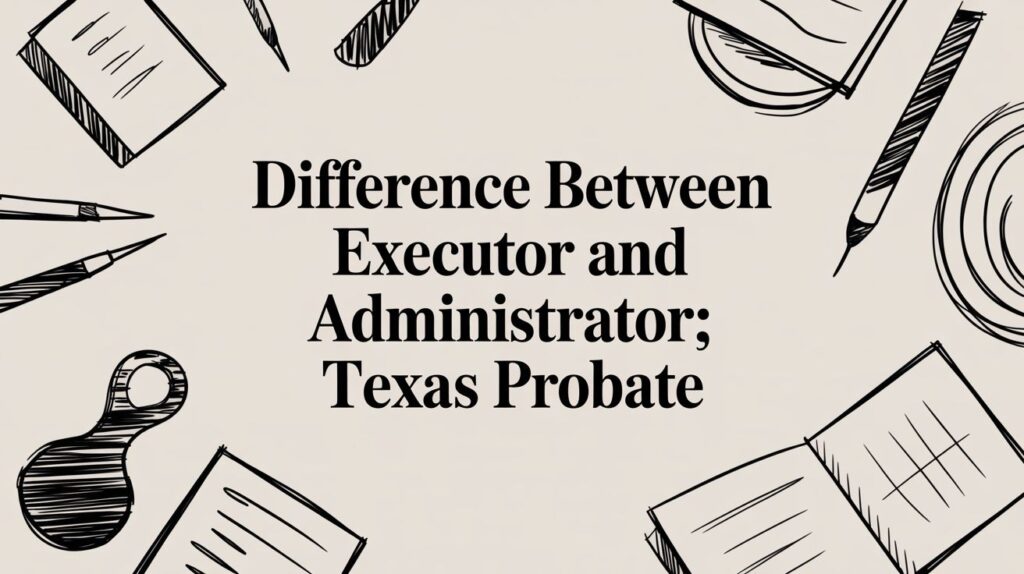Probate, as a legal process, serves as the established method for administering the estate of a deceased individual, ensuring the orderly distribution of assets and settlement of debts. However, navigating through probate can often be complex, time-consuming, and costly. In Texas, individuals have an alternative option to probate, known as the Affidavit of Transfer Without Probate (AOTP). This legal instrument provides a streamlined method for transferring certain assets, such as small estates or assets with designated beneficiaries, without formal probate proceedings.
Understanding the Affidavit of Transfer Without Probate (AOTP) is essential for individuals seeking a simpler and more efficient means of estate administration. However, it is equally important to recognize the process’s limitations and potential legal implications to ensure compliance with state laws and avoid complications.
What is an Affidavit of Transfer Without Probate in Texas?
An Affidavit of Transfer Without Probate (AOTP) is a legal document in Texas that allows the transfer of ownership of certain assets following an individual’s death without formal probate proceedings. This alternative mechanism offers a streamlined and expedited process for estate administration, particularly for estates with assets valued below a certain threshold. The eligibility criteria for AOTP in Texas are twofold: the total value of the deceased’s estate must fall below a specific threshold, currently $75,000. Only specific types of assets are eligible for transfer using an AOTP, such as bank accounts, vehicles titled solely in the decedent’s name, and other tangible and intangible assets with identifiable beneficiaries or legal transfer mechanisms. Assets held jointly with rights of survivorship or those with designated beneficiaries may bypass probate and do not require an AOTP for transfer.
The AOTP Process in Texas
The Affidavit of Transfer Without Probate (AOTP) is a legal document streamlining the transfer of assets from a deceased individual’s estate to designated beneficiaries in Texas. The process begins with determining eligibility, which involves assessing the estate’s value below the $75,000 threshold. The assets intended for transfer must also qualify for AOTP treatment based on their nature and ownership structure.
The AOTP form is then obtained and accurately completed, serving as a legal affidavit that requires detailed information about the deceased individual, the designated beneficiary, and the specific assets being transferred. The form typically includes sections for providing personal details, asset descriptions, and relevant legal statements. The designated beneficiary is then responsible for presenting the AOTP to the relevant financial institution or entity holding the asset(s) slated for transfer. This could involve submitting the AOTP to a bank, brokerage firm, motor vehicle department, or other appropriate entities overseeing asset ownership.
Upon receipt of the AOTP, the financial institution or entity responsible for administering the asset undergoes a verification process to confirm its validity and authenticity. Once the document’s validity is verified, the institution transfers ownership of the designated asset(s) to the beneficiary.
Benefits and Limitations of Using an AOTP
Utilizing an Affidavit of Transfer Without Probate (AOTP) in Texas offers distinct advantages and limitations that individuals should consider when evaluating this alternative estate administration option. Understanding both the benefits and limitations is essential for making informed decisions regarding the transfer of assets and effectively navigating the associated legal implications.
Benefits of Using an AOTP:
An AOTP is a faster and simpler transfer process that bypasses formal probate proceedings, allowing beneficiaries to avoid complex legal procedures. This streamlined approach minimizes administrative delays and provides quicker access to inherited property. Additionally, AOTP can lead to reduced costs compared to full probate proceedings, as it incurs lower fees and administrative costs, making it a cost-effective option for transferring assets to designated beneficiaries.
Limitations of Using an AOTP
The Affidavit of Transfer Without Probate (AOTP) is a legal document that allows the transfer of assets from one person to another. However, it has limitations, including its applicability to estates below a certain value threshold and specific types of assets. In Texas, AOTP is generally only available for estates with a total value below $75,000, excluding the value of the homestead and exempt property. It is also limited to certain asset types, such as bank accounts and vehicles titled solely in the decedent’s name.
Moreover, AOTP does not protect against creditor claims against the deceased individual’s estate. Creditors can still claim against the estate for outstanding debts and liabilities even after the assets have been transferred. Lastly, AOTP may have potential tax implications, including income, gift, or estate taxes. It is crucial for individuals using an AOTP to assess and understand these tax implications to mitigate potential tax liabilities.
When is Probate Necessary Instead of an AOTP?
Probate is a legal process often used to administer the estate of a deceased individual in Texas. However, it is only sometimes necessary when the estate value exceeds the AOTP threshold, as certain assets are not eligible for transfer. AOTP is typically available in Texas for estates with a total value below $75,000, excluding the homestead and exempt property. If the estate’s value exceeds this threshold, probate proceedings are required to address the distribution of assets and settle the deceased individual’s affairs.
Some assets, such as bank accounts or vehicles titled solely in the decedent’s name, may not be eligible for transfer using an AOTP. In such cases, probate proceedings are necessary to address the transfer and distribution of these assets according to applicable laws and regulations. Probate may also be necessary when the deceased individual’s estate involves complex issues or disputes that cannot be resolved through the AOTP process. These issues may include outstanding debts, creditor claims, unresolved legal matters, or disputes among heirs regarding asset distribution.
In cases where multiple heirs or legal complications arise, probate proceedings offer a structured and legally binding process for resolving these issues. It allows for the identification and validation of heirs, the settlement of outstanding debts and liabilities, and the distribution of assets according to the deceased individual’s will or applicable state laws. Understanding these circumstances is crucial for determining when probate is necessary and ensuring the proper administration of the deceased individual’s estate.
Importance of Legal Guidance
Estate planning and asset transfer following a loved one’s death can be complex, especially considering the complexities of Texas probate law and the use of an Affidavit of Transfer Without Probate (AOTP). To ensure a smooth and legally sound process, seeking legal guidance from an attorney experienced in Texas probate law is crucial.
An attorney with extensive knowledge of Texas probate law can provide accurate and tailored guidance to individuals seeking to utilize an AOTP or navigate the probate process effectively. They can assist clients in making informed decisions and confidently executing necessary legal steps.
A knowledgeable attorney can assess an individual’s eligibility for utilizing an AOTP based on the specific circumstances of the deceased individual’s estate. They can evaluate factors such as the value of the estate, the types of assets involved, and any potential complexities that may impact the suitability of an AOTP. Through a thorough analysis, attorneys can advise clients on the most appropriate course of action, whether pursuing an AOTP or opting for probate proceedings when necessary.
Compliance with legal requirements is essential for executing an AOTP in Texas. An experienced probate attorney accurately completes files and executes all necessary documents, complying with legal standards. This reduces the risk of errors or oversights, preventing potential legal challenges or delays in asset transfer.
Mitigating legal risks is crucial for protecting clients’ interests during the asset transfer. Attorneys identify and address any legal issues or concerns that could impact the validity or enforceability of the AOTP, proactively addressing them and implementing strategic measures to mitigate them. Lastly, seeking legal guidance gives you peace of mind and assures you that professionals handle estate planning and asset transfer matters competently.








